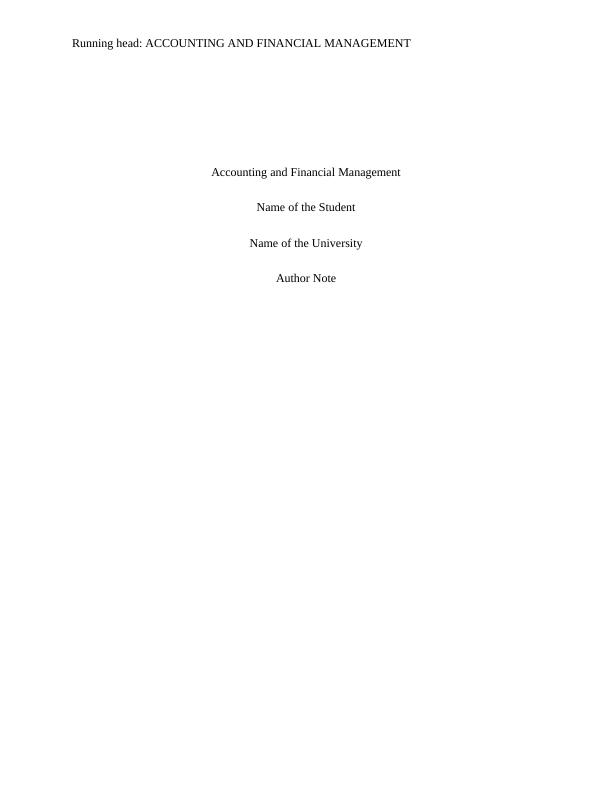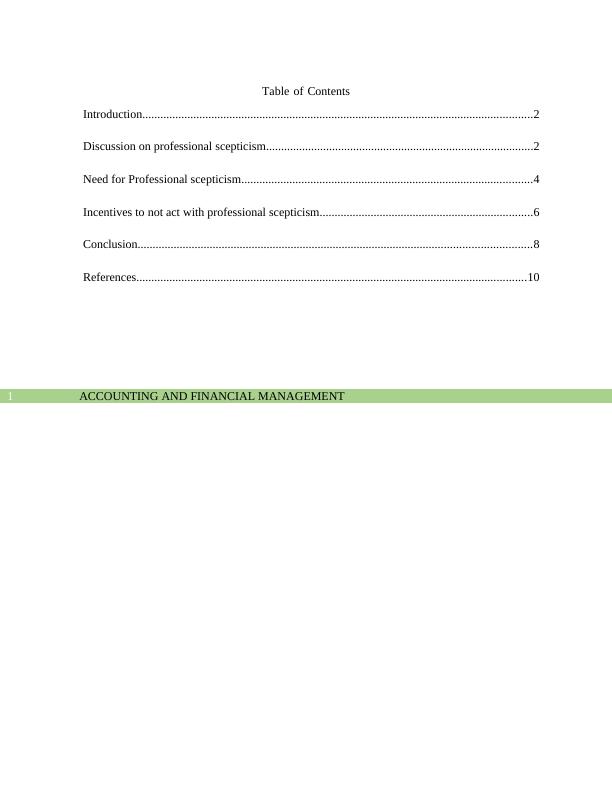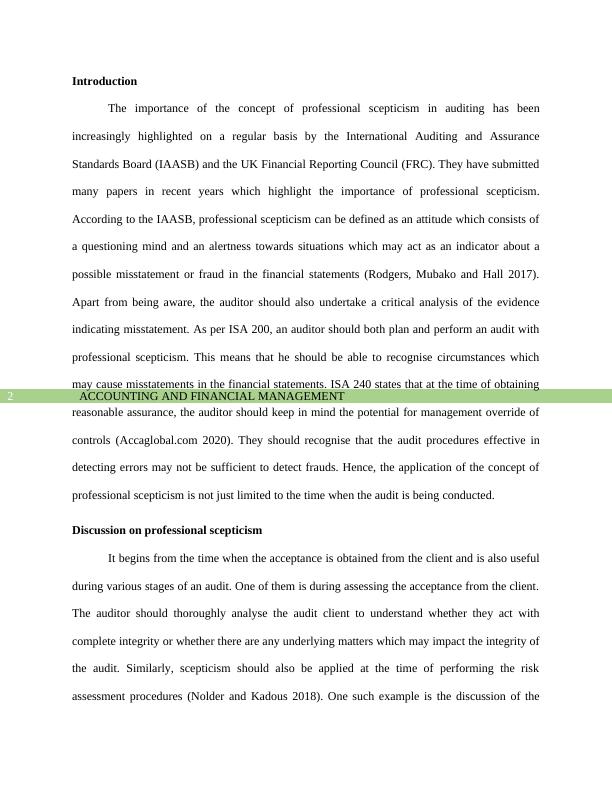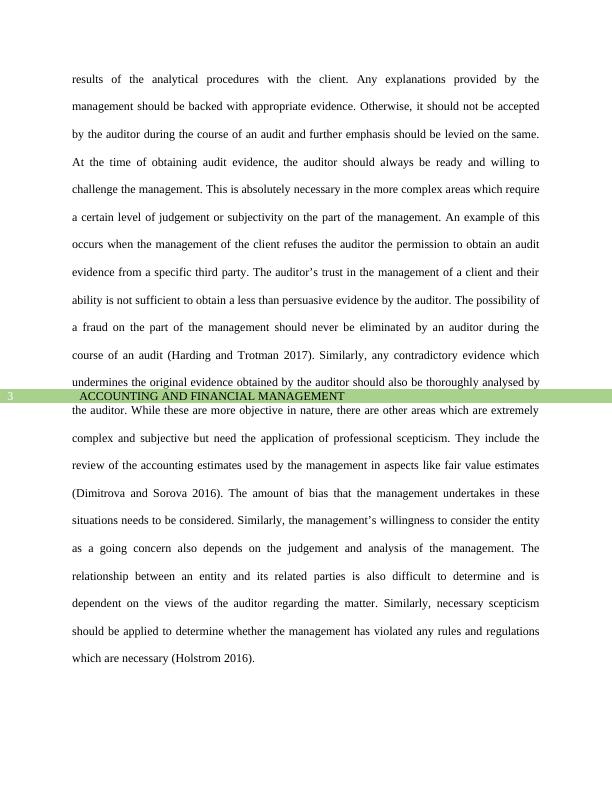Assignment - Accounting and Financial Management
Added on 2022-08-14
12 Pages3114 Words16 Views
Running head: ACCOUNTING AND FINANCIAL MANAGEMENT
Accounting and Financial Management
Name of the Student
Name of the University
Author Note
Accounting and Financial Management
Name of the Student
Name of the University
Author Note

ACCOUNTING AND FINANCIAL MANAGEMENT1
Table of Contents
Introduction..................................................................................................................................2
Discussion on professional scepticism.........................................................................................2
Need for Professional scepticism.................................................................................................4
Incentives to not act with professional scepticism.......................................................................6
Conclusion...................................................................................................................................8
References..................................................................................................................................10
Table of Contents
Introduction..................................................................................................................................2
Discussion on professional scepticism.........................................................................................2
Need for Professional scepticism.................................................................................................4
Incentives to not act with professional scepticism.......................................................................6
Conclusion...................................................................................................................................8
References..................................................................................................................................10

ACCOUNTING AND FINANCIAL MANAGEMENT2
Introduction
The importance of the concept of professional scepticism in auditing has been
increasingly highlighted on a regular basis by the International Auditing and Assurance
Standards Board (IAASB) and the UK Financial Reporting Council (FRC). They have submitted
many papers in recent years which highlight the importance of professional scepticism.
According to the IAASB, professional scepticism can be defined as an attitude which consists of
a questioning mind and an alertness towards situations which may act as an indicator about a
possible misstatement or fraud in the financial statements (Rodgers, Mubako and Hall 2017).
Apart from being aware, the auditor should also undertake a critical analysis of the evidence
indicating misstatement. As per ISA 200, an auditor should both plan and perform an audit with
professional scepticism. This means that he should be able to recognise circumstances which
may cause misstatements in the financial statements. ISA 240 states that at the time of obtaining
reasonable assurance, the auditor should keep in mind the potential for management override of
controls (Accaglobal.com 2020). They should recognise that the audit procedures effective in
detecting errors may not be sufficient to detect frauds. Hence, the application of the concept of
professional scepticism is not just limited to the time when the audit is being conducted.
Discussion on professional scepticism
It begins from the time when the acceptance is obtained from the client and is also useful
during various stages of an audit. One of them is during assessing the acceptance from the client.
The auditor should thoroughly analyse the audit client to understand whether they act with
complete integrity or whether there are any underlying matters which may impact the integrity of
the audit. Similarly, scepticism should also be applied at the time of performing the risk
assessment procedures (Nolder and Kadous 2018). One such example is the discussion of the
Introduction
The importance of the concept of professional scepticism in auditing has been
increasingly highlighted on a regular basis by the International Auditing and Assurance
Standards Board (IAASB) and the UK Financial Reporting Council (FRC). They have submitted
many papers in recent years which highlight the importance of professional scepticism.
According to the IAASB, professional scepticism can be defined as an attitude which consists of
a questioning mind and an alertness towards situations which may act as an indicator about a
possible misstatement or fraud in the financial statements (Rodgers, Mubako and Hall 2017).
Apart from being aware, the auditor should also undertake a critical analysis of the evidence
indicating misstatement. As per ISA 200, an auditor should both plan and perform an audit with
professional scepticism. This means that he should be able to recognise circumstances which
may cause misstatements in the financial statements. ISA 240 states that at the time of obtaining
reasonable assurance, the auditor should keep in mind the potential for management override of
controls (Accaglobal.com 2020). They should recognise that the audit procedures effective in
detecting errors may not be sufficient to detect frauds. Hence, the application of the concept of
professional scepticism is not just limited to the time when the audit is being conducted.
Discussion on professional scepticism
It begins from the time when the acceptance is obtained from the client and is also useful
during various stages of an audit. One of them is during assessing the acceptance from the client.
The auditor should thoroughly analyse the audit client to understand whether they act with
complete integrity or whether there are any underlying matters which may impact the integrity of
the audit. Similarly, scepticism should also be applied at the time of performing the risk
assessment procedures (Nolder and Kadous 2018). One such example is the discussion of the

ACCOUNTING AND FINANCIAL MANAGEMENT3
results of the analytical procedures with the client. Any explanations provided by the
management should be backed with appropriate evidence. Otherwise, it should not be accepted
by the auditor during the course of an audit and further emphasis should be levied on the same.
At the time of obtaining audit evidence, the auditor should always be ready and willing to
challenge the management. This is absolutely necessary in the more complex areas which require
a certain level of judgement or subjectivity on the part of the management. An example of this
occurs when the management of the client refuses the auditor the permission to obtain an audit
evidence from a specific third party. The auditor’s trust in the management of a client and their
ability is not sufficient to obtain a less than persuasive evidence by the auditor. The possibility of
a fraud on the part of the management should never be eliminated by an auditor during the
course of an audit (Harding and Trotman 2017). Similarly, any contradictory evidence which
undermines the original evidence obtained by the auditor should also be thoroughly analysed by
the auditor. While these are more objective in nature, there are other areas which are extremely
complex and subjective but need the application of professional scepticism. They include the
review of the accounting estimates used by the management in aspects like fair value estimates
(Dimitrova and Sorova 2016). The amount of bias that the management undertakes in these
situations needs to be considered. Similarly, the management’s willingness to consider the entity
as a going concern also depends on the judgement and analysis of the management. The
relationship between an entity and its related parties is also difficult to determine and is
dependent on the views of the auditor regarding the matter. Similarly, necessary scepticism
should be applied to determine whether the management has violated any rules and regulations
which are necessary (Holstrom 2016).
results of the analytical procedures with the client. Any explanations provided by the
management should be backed with appropriate evidence. Otherwise, it should not be accepted
by the auditor during the course of an audit and further emphasis should be levied on the same.
At the time of obtaining audit evidence, the auditor should always be ready and willing to
challenge the management. This is absolutely necessary in the more complex areas which require
a certain level of judgement or subjectivity on the part of the management. An example of this
occurs when the management of the client refuses the auditor the permission to obtain an audit
evidence from a specific third party. The auditor’s trust in the management of a client and their
ability is not sufficient to obtain a less than persuasive evidence by the auditor. The possibility of
a fraud on the part of the management should never be eliminated by an auditor during the
course of an audit (Harding and Trotman 2017). Similarly, any contradictory evidence which
undermines the original evidence obtained by the auditor should also be thoroughly analysed by
the auditor. While these are more objective in nature, there are other areas which are extremely
complex and subjective but need the application of professional scepticism. They include the
review of the accounting estimates used by the management in aspects like fair value estimates
(Dimitrova and Sorova 2016). The amount of bias that the management undertakes in these
situations needs to be considered. Similarly, the management’s willingness to consider the entity
as a going concern also depends on the judgement and analysis of the management. The
relationship between an entity and its related parties is also difficult to determine and is
dependent on the views of the auditor regarding the matter. Similarly, necessary scepticism
should be applied to determine whether the management has violated any rules and regulations
which are necessary (Holstrom 2016).

End of preview
Want to access all the pages? Upload your documents or become a member.
Related Documents
Process of Audit and Assurancelg...
|8
|2316
|55
Responsibilities of Auditors in Fraud Detection and Internal Control Weaknesses in a Restaurantlg...
|9
|2202
|39
Auditing and Assurancelg...
|8
|1301
|347
Auditing and Risk Assurance - Doclg...
|11
|2828
|22
The prevalence of any eventslg...
|16
|1770
|14
Professional Skepticism PDFlg...
|13
|3475
|14
